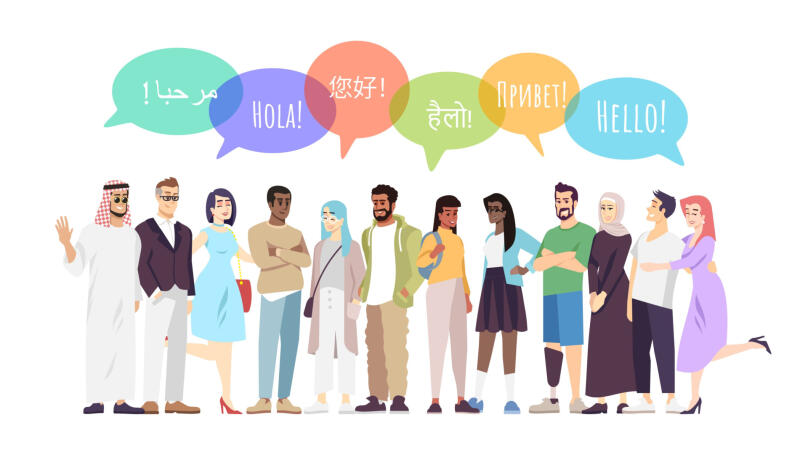Intercultural Communication

What is intercultural communication?
Intercultural communication is happening between people from different cultures, nationalities, and countries. The concept is often used in international business, where people from other countries with different backgrounds work. The ability to conduct intercultural communication means that an employee can learn the patterns characteristic of a particular culture, build into them, and use them when communicating with people who come to work from another country. Understanding foreign cultures and the cultural codes of different countries and using this knowledge in your communication are vital skills that any communicator will need. Knowledge of a foreign language will not be enough, but aspects such as a deep understanding of values and beliefs will help you set up successful communication.
So, effective intercultural communication is about communicating across cultural boundaries and being able to understand them by "translating" them into your language and values.
Why is intercultural communication important?
Firstly, it is essential for teleworking. A company can hire employees from anywhere worldwide: they may live in London or Tel Aviv. Knowledge of English and other foreign languages will help employees fulfil their job duties. Moreover, to successfully grow in your career, you need to be able to communicate with your colleagues and management. Employees who grew up in one culture may live and work in a completely different environment. Continuous improvement of their skills as intercultural communicators will allow them to succeed.
Secondly, it helps to prevent conflict in the workplace. A competent intercultural manager can hear and agree with everyone, explain to employees why a conflict may have occurred and find an approach to solve the problem. It is a terrific tool for overcoming barriers between employees with different cultural codes. Furthermore, conflict prevention also works well for one of the goals of progressive companies - openness and the ability to hear other opinions.
Thirdly, it increases employee engagement. Employees are more likely to stay with the company if they get heard. If employees are happy with the communication and feel needed, valued, and essential, they are unlikely to even look for a new job. These intercultural communication advantages attract many HR professionals to professional development programmes in this area. Organisations that adopt intercultural communication as one of their values perform better than those that do not. Therefore, never underestimate the importance of intercultural communication.
Intercultural communication barriers

There are six barriers in intercultural communication theory, and you can overcome them. Let us tell you how!
- Ethnocentrism is when we look at other cultures through our lens and perceive them only through that lens. It's not the best technique to improve relationships between people with different backgrounds! If we believe that our culture, traditions, and customs are the only correct ones, then other people automatically become strange.
- Stereotypes. It is when we rely on clichés about people from different cultures when we interact with them. For example, Italians like pizza and Americans like hamburgers. We stop asking questions about the culture and think we can predict the person's behaviour, which often doesn't work.
- Psychology. It has to do with changing ourselves and our preferences. To learn intercultural communication, you must address your triggers and abandon old beliefs. Of course, such a process is quite tricky. The concept of intercultural communication implies a certain openness and willingness to change.
- Foreign Language. It is simply knowing the language of the person you consider to be the recipient of messages in intercultural communication. Please learn the language spoken by, for example, half of the employees in your company. This way, you will understand the nuances of the conversation, the meaning of almost synonymous words and other things. Also, you can adjust communication between native speakers and those who do not speak the language.
- Geography, or the distance between people. In global teams, it is much more challenging to communicate with each other because of it. In a traditional offline office environment, finding a communication that works for everyone is much easier. Employees outside the main office may feel excluded from the common agenda, and cross-cultural communication can be the best way to help improve this situation.
- Values. These are the values of employees, which may differ from those of the company. If the behaviour of others compromises our values, we begin to deny and push away that behaviour. For example, employees from Latin America focus on communication as building relationships as a value, while Americans don't read communication and small talk as something necessary and vital. In Germany, the sign of professionalism is maximum clarity, while in Korea, you will be communicated with barely a hint and vague wording. Other examples of different values include a tendency towards confrontation as a sign of trust (common in the Netherlands) or avoiding direct conflict (common in China). Italians will raise their voices without wanting to offend you, while the British will be highly reserved, although they will remember all the little details. In Australia, casualness is a significant value, while all staff will be formal and closed in Japan. In Brazil, they like to start a meeting later than scheduled so they have time to talk to everyone, while in the UK, they will start at exactly the specified time. In Sweden, freedom and quietly expressing one's opinion is essential, while in Morocco, one is unlikely to trust the boss. Each value needs to be noticed, recognised, and considered as one of the crucial traits of a person. It is the challenge of intercultural communication.
Types and forms of intercultural communication

There are many forms of intercultural communication. Let us list the main ones:
1. Social Scientific
In this case, you observe the behaviour of someone from another culture and then compare their behaviour with that of your own culture. You can adjust your conduct in your interactions with this person by recalling this analysis. For example, you could tell this person a story you have already told someone else but do it in your own way: change the emphasis on details, leave out some, and then see how they take it.
2. Interpretive
You accumulate knowledge about another culture by talking to another person and learning their stories about that culture. But here, there is a high probability of encountering subjective and individual experiences. It is impossible to predict how to communicate with people from that culture based on a conversation with that person. However, if they are a critical employee for the organisation, you can use interpretive theory to build a relationship with them specifically.
3. Dialectical
You present intercultural communication holistically. You consider the individual level, the culture, the context in which you find yourself, and the individual's personal circumstances. You also think about the differences and similarities with typical members of the culture, the historical framework, and the socio-political situation in the countries where the culture thrives. You will also need to know what the culture considers a privilege, why, and what items are considered disadvantages.
This approach is the most comprehensive: everything is considered together, the picture - at least it is supposed to be - is seen as a whole, and therefore, you can draw the correct conclusions and set yourself up for intercultural communication with a lot of information about its framework. All the theories are brought together here to form the most comprehensive approach.
4. Critical
Emphasis is placed on the differences of cultures with each other and with the communicator's culture. Much attention is paid to how cultures are presented in the media. This approach is more important in research than practical application, but using it in the workplace is sometimes helpful.
Intercultural communication in business
What are the benefits of intercultural communication in business? You will be able to communicate respectfully and constructively, be comfortable with differences that once seemed unbelievable, and find common ground quickly. Intercultural communication in business is about creating a transparent hiring process in which there is no room for discrimination on various grounds, developing relationships with clients, treating employees with care, and improving relationships within different teams. Coaches point out that cross-cultural communication is the key to business development. In fact, it ensures employee initiatives, diversity of opinions, and the ability to attract the best talent from the market to the business.
But it is not possible to do without the negative. Intercultural communication competence implies, among other things, that employees will be able to cope with the refusal to assume their similarities based on a cultural code, agree to learn a foreign language or help each other to express their thoughts in a familiar, accepted company language. Employees may also face anxiety and difficulties in communication - it is almost impossible to immediately adjust to the new rails and start living according to a new model. For this reason, companies often hire specialists who can help them rebuild and create an open space ready for intercultural communication.
Intercultural communication in the workplace

Intercultural communication in the workplace is a handy skill to help build relationships with colleagues and improve your soft skills. How do you teach intercultural communication? We have a few tips.
1. Embrace cultural diversity
Cultures are many and different; that's a fact. Your colleagues may have different perspectives, traditions, and religions. Consider these differences - you have them too, and they may be strange or incomprehensible to your colleagues. Don't compare other people's cultures to your own; this comparison is usually made with the emphasis that the culture you are used to is more correct than others. If you feel the need, explain how you see the other person's culture and why you react to it in one way or another. If you don't understand why a colleague acts this way, try to find the reason in their culture, ask them directly, and try to hear and understand them.
2. Learn to communicate openly
It is difficult to do if the organisation is rigid, and there are still beliefs that cooperating is dangerous because you can get fired anytime. Learn and teach others, be open but not too open, and introduce new strategies into your behaviour based on collaborative problem-solving and project leadership. Make your point of view as simple and accessible as possible. If necessary, try to learn the basics of the language spoken by your colleagues. Knowing how their language functions can help you understand why they use seemingly crude constructions. These are essential intercultural communication skills that you will need.
3. Build relationships
Intercultural communication allows you to build strong relationships between teams. It's relationships that ultimately create vibrant products and drive the business forward. Building teams that stand behind each other is vital for a communicator working with teams from different countries. You can invite your colleagues for a few calls or face-to-face meetings to build these relationships. Tell them how you would like to change the relationships in the team and why, and suggest a few innovations. Establish relationships with the stakeholders who are essential in your work. It will help you resolve conflicts effectively, find common ground, and work cohesively.
How to improve intercultural communication
If you are not a communicator but want to learn the elements of intercultural communication, try the following:
- Be flexible and open-minded. Every problem has many solutions. There is no one correct answer, like in a test.
- Approach issues with understanding. Try to understand the person you are talking to and find out why they have a particular point of view. Learn about different cultures so you don't get into trouble. Honour the holidays of different cultures.
- Don't be afraid to communicate with colleagues in person. Ask, clarify, and don't be embarrassed by your ignorance. Ask for explanations and be open to new experiences. Exchange opinions, try not to deny what seems strange as soon as you hear it.
Conclusion
Good intercultural communication skills are essential to the job and will help you build your career and learn how to communicate with different people. By the way, don't confuse intercultural communication with cross-cultural communication! The difference between intercultural and cross-cultural communication is that the former is about building relationships with people from different cultures, while the latter is about building relationships with people from your own culture and creating communication between that single cultural group and people from another cultural group. Sometimes, these concepts supersede even within courses, so being aware of their differences is vital.























